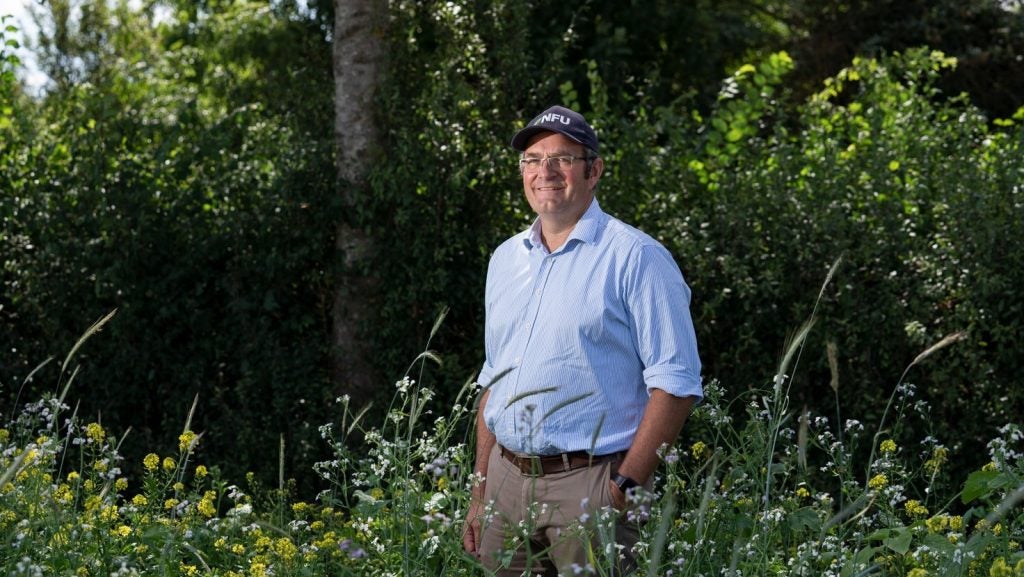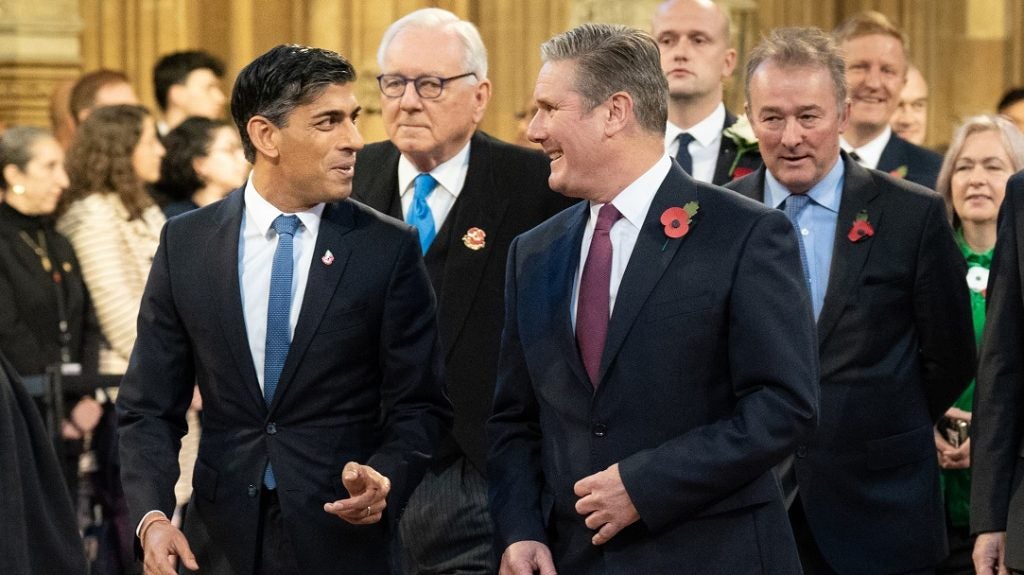It is fair to say agri-food issues, even macro concerns around food security or the fight against obesity, haven’t been front and centre in the debates leading up to the UK’s General Election today (4 July).
Nor have they figured significantly in the main parties’ manifestos, only perhaps peripherally, as in the Labour manifesto, in relation to subjects like skills, labour and relations with the EU.
Perhaps it was this apparent lack of attention paid to the UK’s largest manufacturing industry that prompted a number of food industry trade associations and retail bodies to join forces last month to call on the national political parties to focus more on food security in their campaigns for the election.
A letter was penned to UK party leaders by the National Farmers’ Union (NFU), British Retail Consortium (BRC), the Food and Drink Federation (FDF) and foodservice body UKHospitality.
In their message, the trade bodies said the parties had highlighted plans for “defence and energy security” in recent weeks but argued there has been “very little” about food security.
“The lack of focus on food in the political narrative during the campaigns demonstrates a worrying blindspot for those that would govern us,” they said.
As part of their call for a new UK government to focus more on food security, the trade groups demanded the parties take note of priorities that included cutting “non-tariff barriers with key trading partners”, and creating an “industrial policy” that features “a tax framework incentivising investment, fosters research and innovation in the UK, takes a joined-up approach to immigration, skills and employment policies that ensure the sector has access to the labour it needs”.
To the frustration of these bodies, the parties with a chance of forming a new UK government haven’t appeared to see such issues as ones that will ‘cut through’ with voters and have preferred to focus on other areas.
But food industry bodies will be hoping the important issues they are highlighting will resonate with the next government and, to that end, it is worth taking a closer look at what they are calling for on an individual basis and what their own specific ‘manifestos’ contain.
“We have been pushing for years for a genuine food strategy” – British Meat Processors Association
The British Meat Processors Association (BMPA) represents the UK’s meatpackers and the sector has faced labour issues since the country’s departure from the EU stymied its ability to bring in workers from abroad.
CEO Nick Allen says: “Labour is a big one for us. There needs to be recognition that our sector has got specific requirements, which needs to cut through the other noise around the politics of immigration.
“We’ve always been pro-alignment with Europe, which is our biggest export partner. Labour and the Liberal Democrats do seem to be pro-alignment. Cutting out import and export bureaucracy would be supportive.
“Overarchingly, we have been pushing for a number of years for a genuine food strategy. The recent Farm to Fork Summit seemed to focus all efforts on the fruit and veg sector. We need a bit more acceptance of the challenges of the processing sector. We haven’t seen a lot happening on that front. It feels at times like we are the ignored part of the industry.

“On trade deals, there is plenty of evidence to suggest they [the last government] has learnt their lesson after the Australia and New Zealand trade deal [which the BMPA feared would lead to the import of meat that would undercut domestic produce].
“I hope that lesson has been learnt. Whether we can re-negotiate the Australia and New Zealand deal, I don’t know.
“With apprenticeships, we have supported what has gone on with the apprenticeship scheme but companies are paying into a levy but don’t feel they are getting anything out of it.
“The next government need to have a really good look at how the levy works, at how it can be utilised to genuinely make an impact.
“We are also watching EU deforestation legislation. It could be very complicated for us exporting into Europe. We are only supposed to be six months away from this being implemented so we need to get our act together as a third country outside the EU. There has been no decent engagement with government on this.
“Having a food minister is also one of the things we’ve discussed. Having a food tzar or someone similar who could oversee things and have some clout and get involved in it all and not be bound by any particular government department, a bit like Michael Gove as Levelling Up Minister, could be useful.”
“The next government needs to engage with the industry more” – Provision Trade Federation
The dairy-, meat- and seafood-focused Provision Trade Federation (PTF) has a similar wishlist.
Director general Rod Addy says: “Our own manifesto focuses on key areas, food security – the resilience of the domestic supply chain – international trade, climate change and the environment, labour and skills, health and well-being and cost management and supply chain fairness.
“The general feeling in the industry is that the next government needs to engage with the industry more and listen more.
“Trade bodies have been singing from a common hymn sheet but it hasn’t filtered through. Chopping and changing in government has been part of the issue but there’s a sense that perhaps they've not taken things on board and there is a need to involve all of the industry in talks.
“We are in a period of sustained volatility. One of the big reasons is climate change. The impact of this will come down the line on an annual basis. This volatility will have a knock-on effect on the supply chain.

Credit: Provision Trade Federation
“Also, as a trade association, we have an international flavour. The UK being 60% self-sufficient in food is a reasonable target but the 40% has to come from elsewhere so we have to protect the international supply chain. Food security needs to be made a policy in its own right.
“And, within trade, we need a level playing field for domestic producers and the international supply chain. Standards do need to be maintained. Food can be processed more cheaply where they don’t have the same standards.
“On our relationship with the EU, clearly some sort of alignment would be beneficial. We don’t want further divergence from what remains our largest trading partner. I would like to see closer working with the EU.
“I would also like to see greater access to labour across the piece. We do recognise that reliance on cheap labour is not a solution either but you have to start from where you are and not the ideal.
“The labour case has been well made on the arable side but the government has not taken on board in the same way people working on production lines.”
“The next government must help unlock the full competitive trade potential of the UK’s largest manufacturing sector” – Food and Drink Federation
In the introduction to its 2024 manifesto document, Powering our Nation into the Next Decade, UK food manufacturing industry body the FDF says: “We know we must work to become more sustainable, innovative, healthier and drive growth. To do this we want to partner with the next government so that together we can unlock the potential of the UK’s largest manufacturing sector.”
The FDF, which counts companies including Nestlé, PepsiCo and Mondelez International among its members, adds: “Our industry knows that we must play an active role in tackling climate change. We must continue to adapt in order to keep producing food for a growing population. We must protect our natural environment by lowering our emissions, reducing plastics and waste, shifting to greener energy solutions and building more sustainable supply chains.
“The next decade will see the industry embrace the opportunities of new
and improved innovation and technology. This change is critical to securing the resilience of agricultural and food systems in the face of climate change, in order to provide reliable access to safe, sufficient, affordable and nutritious food for all.
“It is imperative, therefore, that we keep up the pace of transformational
research and development in our industry so we can find novel ways of tackling the challenges ahead, whether by increasing crop yields, controlling animal disease, improving soil health, implementing data or increasing recyclable packaging which also cuts down on food waste.”
The document goes on to outline the need for an effective regulatory environment, the importance of creating the workforce of tomorrow and the necessity of having a coherent trade strategy.

On this last point, Balwinder Dhoot, the FDF’s director of industrial growth and sustainability, said: “The next government must help unlock the full competitive trade potential of the UK’s largest manufacturing sector by delivering a trade strategy that builds business confidence and provides greater support for exporters to arrest this decline.”
“It’s clear that our constructive and open lobbying on many areas has been listened to” – National Farmers’ Union
The organisation which represents the UK’s agri-food industry responded to the political parties’ manifestos by outlining its priorities for the next government.
NFU president Tom Bradshaw says: “There are plenty of positives across the three manifestos and it’s clear that our constructive and open lobbying on many areas has been listened to.”
But Bradshaw bemoans the lack of commitment towards specific funding support for the agriculture sector.
He suggests an agricultural budget of around £4bn ($5.06bn) would support the delivery of a balanced agricultural policy, with around £2.7bn needed to meet the government’s environmental goals, outlined in its Environmental Improvement Plan, and those proposed by its Climate Change Committee.

“This isn’t just ‘money for farmers’, it’s the funding which helps the sector transition away from the old EU system, allows farm businesses to invest for the future and makes governments’ aims around sustainable food production, food security, the environment and net zero possible,” he says.
“We are continuing to engage with candidates across all parties to highlight the importance of a thriving homegrown food sector and the need for resilient and profitable farming and growing businesses to underpin it.”
“Easier movement of goods into the EU should be better supported” – YF
YF, formerly known as Young Foodies, is a consultancy for SMEs (small- and medium-sized enterprises), many of them challenger brands in the food and beverage area. Their specific needs from the new UK government are outlined by the organisation’s CEO, Thea Alexander.
“More grants and financial support such as new innovation grants or R&D tax credits to boost growth potential such as more sustainable packaging, new product development and process improvements [would be useful]," Alexander says.
“Manufacturing support grants would help to upgrade manufacturing processes, adopt new technologies, and improve efficiencies.
“I would also welcome SME loan guarantee schemes to reduce bank lending and access to venture capital and private equity through networks and investor incentives to fund innovative FMCG start-ups.
“Easier movement of goods into the EU should be better supported through more streamlined customs declaration processes for low-value and low-risk goods, reducing paperwork and delays. Also, implementing digital-first measures through the use of blockchain technology will help create a more secure, transparent and efficient supply chain journey which will ultimately serve the conscious consumer. A triple-win for the movement of consumer goods.

“More administrative support to help SMEs overcome the new barriers around Brexit [would be desirable]. In particular, the creation of a centralised support portal that brings together all the necessary information SMEs need to have in one easily accessible, interactive location.
“Whilst YF offers SMEs advisory on Brexit-related regulations and compliance, it would be beneficial for the entire industry for government to produce comprehensive yet digestible resources detailing new requirements for import and export, such as guidelines around product standards, labelling, and safety.
“There is a clear need for more grants and financial support in the training and development of people. I urge government to introduce tax training credits for SMEs that invest in employee training, reducing their overall tax burden and encouraging ongoing professional development.”
“Salmon farmers want to see a more enlightened approach to the movement of labour into the UK” – Salmon Scotland
The trade body for the Scottish salmon industry published its own ‘manifesto’ ahead of the election.
It says: “Whichever party wins on 4 July, salmon farmers want to see a more enlightened approach to the movement of labour into the UK, which recognises the unique challenges that coastal and rural farming communities face.
“This includes a change to key worker definitions and a broader public signal that the UK is open to people coming here to work.
“The sector also wants to see an improvement in the UK’s relationship with the EU, with a clear focus on the nation’s export businesses and less red tape for the supply chains on both sides of the English channel.
“Salmon Scotland is urging the next UK government to implement electronic export health certificates (EHCs) to remove the unnecessary paperwork associated with exporting salmon to Europe.
“The trade body also wants the Scottish and UK governments to work together to address Scotland’s housing emergency, to ensure that people can live close to where they work – particularly in rural and coastal communities where there is a shortage of available, affordable accommodation.”
What would campaign groups like to see from the next government?
Pressure group Action on Sugar/Salt has outlined what it thinks are the policies that should be adopted by a new UK government to help tackle obesity.
Sonia Pombo, campaign lead and nutritionist at Action on Salt, says: “Immediate priorities are to push advertising restrictions for TV and online. This has already been delayed to October 2025 but, in order for it to pass into law, there are a couple of processes that are currently outstanding and need to be actioned before the end of September 2024. Failing to do so will risk further delays in its implementation.
“And the release of commercial baby food and drink guidelines which have already been consulted on twice but not yet published despite many businesses and health bodies wanting it.
“Longer term, we would like to see the implementation of mandatory reformulation targets for salt, sugar and calories, with financial disincentives such as different types of taxes for businesses who fail to comply.
“The current programmes have failed due to its voluntary nature and a lack of government resources which has created an uneven playing field.
“Also the establishment of an independent body to deliver on reformulation and regularly and transparently monitor progress.”
Meanwhile, at Sustain, the organisation which advocates for food and agriculture policies that promote the health and welfare of people and animals, has drawn up its post-election wishlist.
It says: “We want to see more support for agro-ecological farming and better routes to market in the UK, food included in local and national climate and nature emergency plans and a halt to the expansion of factory farming.
“We would like to see healthy school food for all and an expansion of the school fruit and veg scheme, expansion of Healthy Start and cash-first solutions to household food insecurity.”
It has also called for “mandatory measures to get companies making food and drink healthier and protecting children from unhealthy food and drink advertising and marketing.”









